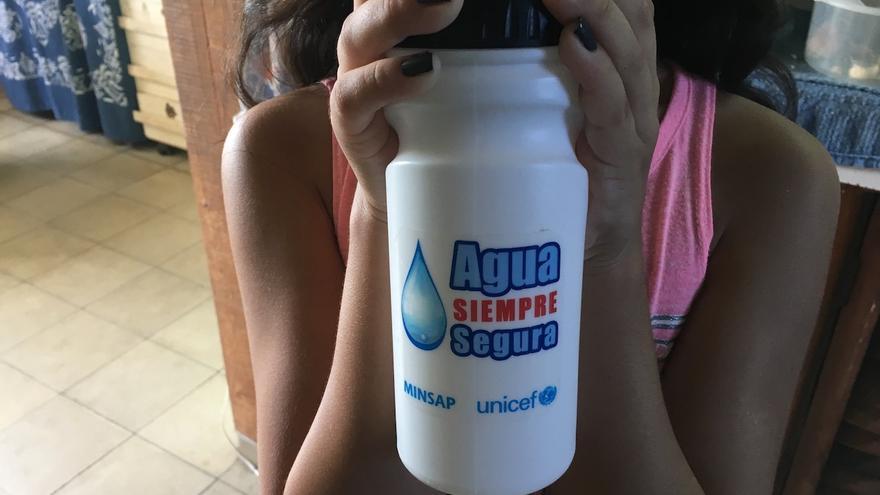
![]() 14ymedio, Havana, 13 June 2019 — Cubans will pay more for water starting in 2020 when new rates go into effect in an attempt to “encourage conservation” in a country were more than 20% of the water for the residential sector is lost because of the bad state of the pipes.
14ymedio, Havana, 13 June 2019 — Cubans will pay more for water starting in 2020 when new rates go into effect in an attempt to “encourage conservation” in a country were more than 20% of the water for the residential sector is lost because of the bad state of the pipes.
The measure, approved last March by the Council of Ministers, will bring progressive increases in the rates for water service which in some cases will quadruple over the current price, according to data in the official press this Thursday, from Bladimir Matos Moya, vice president of Hydraulic Resources (INHR).
The new rates will factor in the amount of water and the number of people. When, in one case, between 4.5 and 6 cubic meters per capita are consumed in a month, the user will pay 1.50 CUP for each cubic meter, instead of the current 0.75. If the consumption is between 7.5 and 8.5 cubic meters, the price will be 7 CUP per cubic meter and rise to 15 CUP for usage over 8.5 cubic meters.
“The price, then, is a regulator of consumption, so the costs will go up for those who consume the most water,” said Matos. In 2018, 300 million cubic meters were lost, the equivalent of 5 million dollars worth, in leaks in the pipes between dwelling units.
The bad state of the pipes, the high prices for plumbing fixtures, the difficulties in buying faucets, are some of the reasons that affect the domestic water situation on the island.
But the rise in prices will not only affect residential customers, but also all productive sectors, private as well as public. The new prices will only apply in cases where the home, multi-family building or locale has a water meter. Calculations suggest that in the residential sector only 22% of homes meet this requirement, while in the State and productive sector 90% do.
Consumers who don’t have a meter, because it’s broken or not installed, will continue to be charged a fixed price of 8 CUP a month for water, and 2.40 CUC for sewer service. Many families in rural areas are in the situation, as are those in informal neighborhoods and housing with serious infrastructure problems that don’t support the installation of a meter.
The announcement has not been well received by many residential customers, who lament the rise in prices for a service that is frequently interrupted. In the large cities, such as Havana, a lack of water is chronic in several neighborhoods and municipalities.
For Ricardo, who lives in Santiago de Cuba, he can’t see a rise in prices for water before resolving the supply problems. “In the zone where I live, known as Central-North, the service comes every 15 days. And then?” he lamented this Thursday speaking to the national press.
“What this leads to is illegalities because if next to my house there is a neighbor who doesn’t have a meter and pays a fixed price, what’s going to prevent us from running a water pipe so I don’t have to pay the new progressive rates,” asks a resident in the Central Havana zone, frequently tortured by the lack of supply.
“You can’t apply a measure like this without guaranteeing everyone a supply and without having made the repairs that guarantee we will get water every day,” adds this resident of the Cuban capital who prefers anonymity. “It’s going to be like with the electricity where they raised the price so much that turning on an air conditioner in a country as hot as this one is a luxury.”
The rates also raise objections among the residents of buildings with a single meter at the entrance, where “consumption” must be divided “equally.” Alina, a resident of a five-story block with twenty apartments located in the municipality of Plaza de la Revolución, argues that among her neighbors “there are people who wash every day, wash the car or fill an inflatable pool.”
Meanwhile, others consume much less water, as is in her case, as she lives alone and doesn’t have a “single leak” in the pipes in her home.
In many places, water still arrives in tanker trucks. According the INRH official, where there is no infrastructure this service will continue to be free, although in other cases, “the new established prices will be applied.”
___________________
The 14ymedio team is committed to serious journalism that reflects the reality of deep Cuba. Thank you for joining us on this long road. We invite you to continue supporting us, but this time by becoming a member of 14ymedio. Together we can continue to transform journalism in Cuba.
